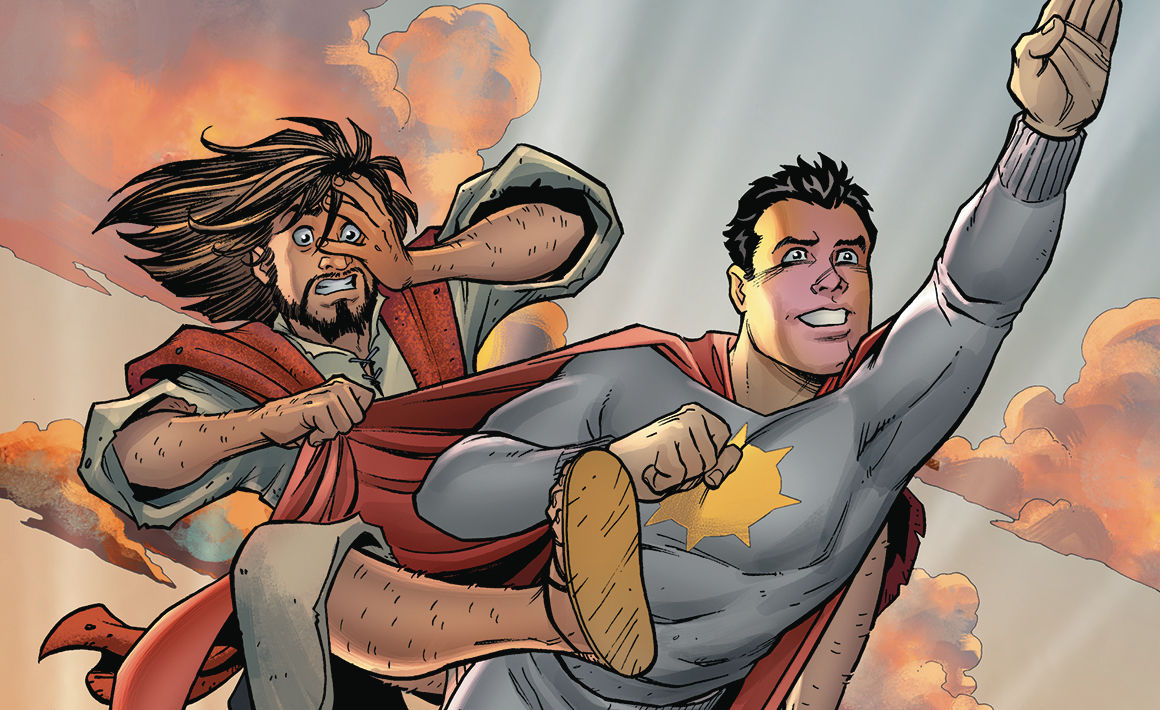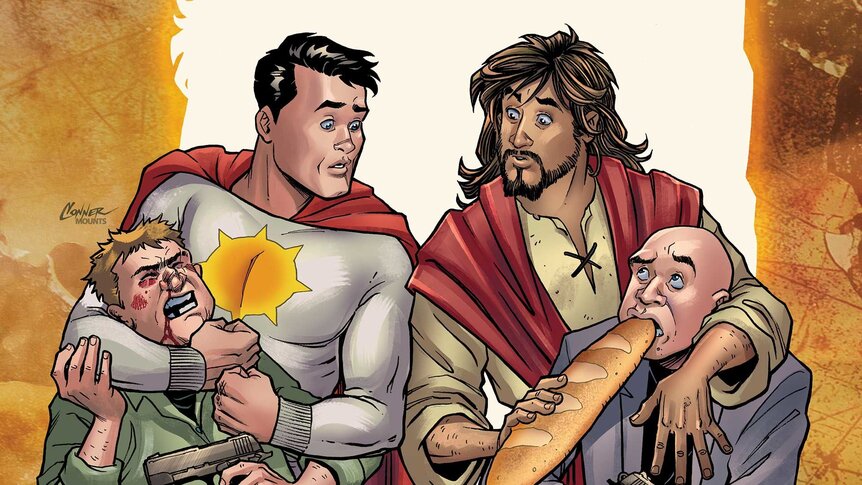Create a free profile to get unlimited access to exclusive videos, sweepstakes, and more!
Exclusive: Mark Russell responds to DC's cancellation of his Jesus-themed comic: We wanted to be 'true to its vision'

A great many people were surprised by the news, just weeks before the first issue was to debut, that DC Comics had canceled orders for Mark Russell and Richard Pace's Jesus Christ satire series, Second Coming. Don't count the creators among those caught off-guard.
In an exclusive interview with SYFY WIRE, Russell explains that he and co-creator Richard Pace knew the series, which was to be published under the Vertigo Comics imprint, was going to be pulled because they had requested to have the book's rights returned to them.
"It wasn't because of any displeasure with DC or their editorial staff," Russell says. "It was just that they wanted to push the release date back to some undetermined point in the future and I had made some minor changes at their request, after which, I was warned that requests for more significant changes would probably be on the way. So I decided I would rather keep the story intact and remain true to the original vision and get into the hands of readers in a more timely fashion."
The writer emphasizes there was no bitter breakup or backstage drama, and is grateful for DC/Vertigo's editorial team for being gracious enough to return the rights to the comic to him and Pace. "Everyone who worked on the book at Vertigo was happy with it and I think they all are with me in wanting to see this book be as good and true to its vision as it can be. Nobody really wants a watered-down, one-size-fits-none version of this story, so they graciously agreed to let me have it back."
"Richard and I... both agree that the most important thing is to take it to a publisher that will ensure that it prints as the best possible series it can be," he adds. "We also want a publisher who can get it to fans in the near future, so we hope to be able to announce a new home as soon as possible."
Second Coming tells the story of Jesus Christ returning to Earth and being horrified to learn his teachings have been distorted and that the people of Earth worship the superhero Sun-Man more than the Son of Christ. The series was to be part of DC's much-publicized relaunch of the fabled Vertigo imprint. But controversy over the subject matter of the book quickly spread, once conservative outlets such as Fox News and CBN News ran stories on it and an online petition denouncing its "blasphemous" take gained traction. It isn't a stretch to surmise that the negative attention led to DC having second thoughts about Second Coming.
"We had a conference call with them after they read all six issues of the series that I had written to date. They really loved it. It was a great meeting. But then when word came down later that changes would have to be made, we all felt deflated," admits Russell, the Eisner-nominated writer behind Snagglepuss and the new Wonder Comics title Wonder Twins. "We felt that we had this story right where we wanted it to be and that changing it more would be a step backward. I really enjoyed working with Vertigo's editorial team, and they seemed happy with me, but a book is like a child, and in the end, you have to do what's best for the kid."
Russell wouldn't speculate on the influence the petition had on DC's decision to ask for more changes made to his comic, but he did weigh in on the timing of Fox News picking up the story.
"The weird thing about the Fox News story was that it was published six months after Vertigo announced Second Coming," he explains. "This is a pretty common tactic with Fox News. We were in the midst of a long government shutdown that most people blamed on Trump, Mueller was handing out indictments like chocolate on Easter, and nothing was looking particularly good for their political narrative. When that happens, as it often does, Fox likes to lean on culture war stories, both to change the subject and to rally the base around some manufactured outrage. The release of Second Coming wasn't newsworthy to them until they needed it to be."
SYFY WIRE has reached out to DC Comics for comment. Gregory Mertz, the U.S. campaign director for Citizien Go, the group behind the online petition, shared this response:
"This was the right move by DC Comics. We’ll continue to fight the release of this comic book if it’s picked up by another publisher. Jesus is much more than a superhero. The signers of the petition believe that Jesus is real. The life of Jesus comes with a special message of hope and redemption. The comic portrays a false view our Savior. Jesus is not a failure. He was sent to the cross for our sins and everlasting salvation. Most children grow up reading about iconic DC superheroes like Batman, Superman, or Wonder Women. It would be a shame to market this false view of Jesus as an equal read to these figures. I wouldn’t want children to read this comic book and believe it as truth. I’d challenge the author to read the bible, consult with some pastors, and bring the life of Jesus back to a comic book as it was foretold and written in the Bible."
Russell is no stranger to tackling religion in the graphic arts. He retold the Bible in condensed version with cartoonist Shannon Wheeler in 2013's God Is Disappointed in You. And his strong opinions on religion were formed while growing up surrounded by Christianity.
"I think once people actually read the book, a lot of them will be embarrassed by how up in arms they were. It's actually a very pro-Christ comic, as he's the character who actually offers a meaningful alternative to violence," Russell says. "Superheroes tend to lean on violence as a solution because it's what they're good at. But drop-kicking someone into a volcano or throwing them through a plate-glass window only works for solving a very small percentage of human problems. The other 99.9% of problems require empathy and that's the superpower that Christ brings to the table."
Russell expounds further on what he views as the true mission behind those who criticized his and Pace's book, without having read it first. "I think the religious fundamentalists and critics who are trying to stop Second Coming aren't interested in protecting Christ so much as their ability to control his narrative," he offers. "Mega-churches, Fox News pundits, and YouTube outrage merchants see Christianity as their product and view anyone else talking about Christ as a form of copyright infringement. That's really the only explanation for how they can be so upset over a comic book they haven't even read. They probably (correctly) suspect that it's not Christ who's being parodied, but themselves and how they've twisted his teachings of mercy for the powerless into a self-serving tool of the powerful."
"I first heard of CitizenGo, the company that ran the online petition to get DC to drop Second Coming, when they ran this silly campaign to get the buses in Portland to drop ads featuring lesbians. They would be completely ridiculous if not for the fact that social media's anger-made-easy platforms give them access to cranks from all over the world. But it's OK. Some enemies are worth having."
When it's pointed out that the company that got cold feet on Second Coming was the same imprint that once published Preacher, Russell points out that we live in a vastly different era.
"I think [Vertigo] can and will continue to take risks, but there's some big differences in the climate now and when Preacher was published," he says. "For one, the publishers are much more about brand protection because they've got multi-billion dollar movie and merchandising empires built on top of these comic books now," Russell said.
"So they're much more reticent, it seems, to take risks that may impact those brands. And also we now have social media. Somebody who was never going to buy a comic anyway and perhaps doesn't even care that much about whether or not it does come out can still spend eight seconds tweeting about it, or signing an online petition which automatically generates an angry e-mail, etc. So it amplifies and consolidates a lot of outrage and makes things like this seem more potent than they really are."
Subscribe here on Apple Podcasts (also available wherever you get your podcasts)



























